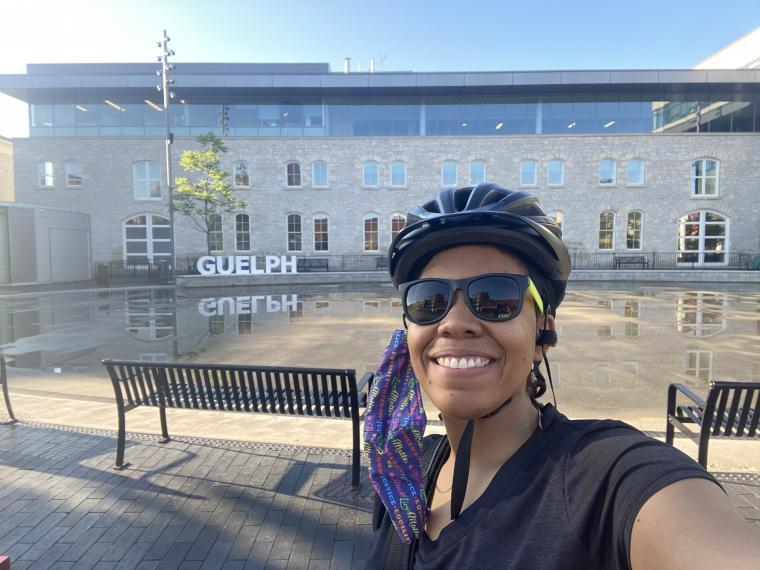Grad Combines Love Of Teaching with Aircraft Tech

Dr. Elyse Hill (she/her) recently completed her PhD in the School of Engineering at the University of Guelph with a focus on control systems engineering. Hill came to the University of Guelph for graduate studies from the University of Maryland Baltimore County (UMBC) and will now pursue a prestigious position with the National Aeronautics and Space Administration (NASA) Postdoctoral Program. Hill’s goal is to blend her childhood dream of working at NASA with her desire to teach at the University level.
What made you choose the University of Guelph for graduate school?
I chose U of G because my undergraduate advisor at the time, Dr. Andrew Gadsden, was a faculty member where I was studying – the University of Maryland Baltimore County (UMBC). I volunteered in his lab, and when he returned to Canada during my senior year we kept in contact. I was already looking into applying for graduate school outside of the United States, so I asked him if he had any suggestions for Canadian institutions.
He suggested I come to the University of Guelph, and that’s that.
What’s something that really stood out to you during your time at U of G?
Something that really stood out to me was the interdisciplinary nature of the undergraduate engineering program. In my undergrad, the different engineering disciplines did not interact beyond our freshman year and each discipline had distinct departments (i.e. Mechanical Engineering Department, Chemical Engineering Department, etc.).
At U of G, however, the engineering students interacted in design courses nearly every year. I found that fascinating, especially from a teaching perspective as a Teaching Assistant, because the variety of perspectives really allowed the students to develop a holistic approach to problem solving. I can say from experience that you’ve never quite seen problem solving like a group of Water Resource, Mechanical, and Environmental engineering students tackling a design challenge together.
Tell us about your research interests and your thesis.
My research focus is on control systems engineering, which basically means designing a “controller” or algorithm to achieve a desired response based on data. Think of a household air conditioner turning on when the temperature isn’t cool enough, or a self-driving car adjusting to stay in a lane.
My thesis research was specific to controlling systems in the event of faults, which are known as fault-tolerant controls. For example, if a turbine in a plane only works in a diminished capacity (or even stops), can the plane still be flown along its desired path with the same controller? Can it be flown safely and still adhere to other operating constraints?
You’ll soon be starting an exciting postdoctoral fellow position with NASA. Tell us about what this means for you and how you positioned yourself to stand out.
I applied to and was recently accepted into the NASA Postdoctoral Program (NPP), which is administered by the Universities Space Research Association (USRA). In my role as an NPP Fellow, I will look at developing advanced controls techniques for electrified aircraft propulsion, which is currently one of NASA’s priorities for cleaner, less noisy, and more efficient propulsion.
Conveniently, the specifics of the position were directly in-line with my thesis on fault-tolerant controls, which put me in a great position when I applied. Having several publications published in and prepared for conferences and journals, along with having other distinctions including scholarships listed on my CV, seemed to improve my networking during my application process. I look forward to soon starting my position and learning all that I can during my tenure with the NPP.
What role has your network and community at the University played in your academic journey?
The network and community I developed in my time at U of G have significantly impacted my academic career. My advisors taught me how to be a better researcher; my colleagues taught me how to think outside the box; and my students taught me how to be a better educator and mentor. At all points in my academic journey I was challenged, but not overwhelmed, by the people I surrounded myself with, which has made me a stronger member of the academic community.
Do you have any interests or passions you’ve pursued throughout your studies (beyond your research)?
Honestly, my biggest passion is learning for the sake of learning. I have a subscription to Wondrium (formerly The Great Courses), which is a service that hosts hundreds of courses on a plethora of topics. My personal favorites are courses on philosophy and history. As a researcher, educator, and student, I believe in lifelong learning so any opportunity to learn more about topics I am unfamiliar with is exciting to me.
Do you have a saying, quote, or philosophy you’d like to share?
The philosophy I try and live by combines the intentions of “Something is always better than nothing” and “Progress, not perfection.”
My engineering motto is “It doesn’t exist if it is not written down.”